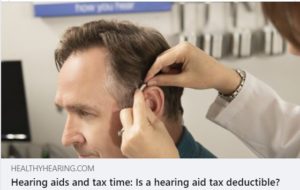We are coming up on our Tax Deadline, which is normally April 15th, but this year the IRS has extended the filing and payment deadline to May 17th.
But the big question everyone wants to know is: Are my hearing aids tax deductible?
 In a great article in Healthy Hearing by Debbie Clason, it states: Many of your medical expenses are considered eligible deductions by the federal government. Since hearing loss is considered a medical condition and hearing aids are medical devices regulated by the FDA, you may be able to deduct these costs.
In a great article in Healthy Hearing by Debbie Clason, it states: Many of your medical expenses are considered eligible deductions by the federal government. Since hearing loss is considered a medical condition and hearing aids are medical devices regulated by the FDA, you may be able to deduct these costs.
Are hearing aids tax deductible?
Those with large, uninsured medical and dental expenses during the year—such as hearing aids, which can cost up to $6,000 and are not often covered by insurance—may benefit from itemizing. What does the IRS consider deductible medical expenses?
They provide detailed information regarding deductions for medical and dental expenses, but here is a partial list:
~ Payments of fees to doctors, dentists, surgeons, chiropractors, psychiatrists, psychologists and nontraditional medical practitioners
~ Payments for in-patient hospital care or residential nursing home care
Payments for acupuncture treatments, smoking-cessation programs and weight-loss programs for a specific disease diagnosed by a physician
~ Payments for insulin and other prescription drugs
~ Payments for admission and transportation to medical conferences relating to chronic diseases you or family members have
~ Payments for dentures, reading or prescription eyeglasses, contact lenses, hearing aids, and guide dogs for the blind or deaf
~ Payments for transportation which are essential for your qualifying medical care expenses
~ Payments for insurance premiums you paid for
How much can you deduct?
You can only deduct the amount of the total that exceeds 7.5% of your adjusted gross income. For example, if your adjusted gross income is $50,000, you can deduct the cost of any allowable medical expenses that exceed $3,750. You can calculate the amount you’re allowed to take on Schedule A (Form 1040 or 1040-SR).
Allowable deductions for hearing loss
In the case of hearing loss, allowable deductions include any payments you made for your diagnosis and treatment, which include what you paid for your hearing aids. While that may not add up to much by itself, it may be a significant factor when combined with your family’s other medical and dental expenses.
Additionally, you also may be able to deduct the costs for transportation associated with your hearing loss, including actual fares for taxi, bus, train and ambulance rides. If you don’t use public transportation, the actual out-of-pocket expenses you incurred for your personal vehicle are deductible, such as gas, oil and mileage, tolls and parking — but only as they directly relate to your qualifying medical expenses.
Obviously, this process requires that you’ve kept good records and receipts for things that probably didn’t seem important at the time—like bus fare and trips to the gas station. If you didn’t keep all of the receipts necessary to take full advantage of these medical deductions this year but think itemizing may be beneficial, you’ll want to make a plan for tracking these expenses next year.
Health spending medical accounts
If you don’t have enough deductions to make itemizing worth your while, it may be beneficial to use pre-tax dollars to help pay for your hearing health costs. Check with your employer to see if they offer health spending medical accounts (HSA), also known as Flex Spending Accounts (FSA), Medical Savings Accounts and Health Reimbursement Arrangements.
Read the full article by CLICKING HERE
We are here to help if you or a family member is having any difficulties with hearing, hearing aids, hearing aid apps or Tinnitus please give us a call at 727-323-2471 and set up an appointment.
We can help you.
Susan E. Terry, Au.D., F-AAA, F-NAP
Doctor of Audiology
Board Certified
P.S. We are here to help if you have any questions about your hearing, feel free to give us a call at 727-323-2471